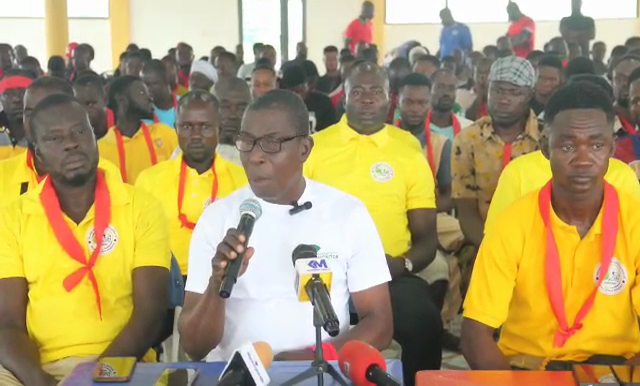The small-scale miners of Ghana’s Amansie South District find themselves in a precarious position. While acknowledging the government’s commitment to combat illegal mining, they are pleading for recognition and protection for their legitimate operations. Their livelihoods, they argue, are being unjustly threatened by the persistent presence and actions of an anti-illegal mining task force. This task force, despite being withdrawn from other districts, continues to operate within Amansie South, allegedly seizing equipment and disrupting the work of licensed small-scale miners. The miners contend that this ongoing harassment contradicts President Mahama’s 2024 campaign promises to support and sustain their sector. They urge the President to intervene and ensure that the task force distinguishes between lawful and unlawful mining activities, thereby safeguarding the livelihoods of those operating within the bounds of the law.
The heart of the issue lies in the perceived indiscriminate nature of the task force’s operations. While the miners express full support for the government’s crackdown on illegal mining, especially the devastating practice of riverbed mining, they insist that the task force’s current approach fails to differentiate between legal and illegal operations. This lack of distinction has resulted in legitimate miners being targeted, their equipment confiscated, and their livelihoods threatened. They argue that this not only undermines their economic stability but also contradicts the President’s own assurances of support for responsible small-scale mining. The miners’ plea, therefore, is not for a cessation of anti-illegal mining efforts, but for a more nuanced approach that respects the rights and livelihoods of those operating legally.
The continued presence of the task force in Amansie South, while withdrawn from other districts, has created an atmosphere of fear and uncertainty within the community. The miners report that the constant movement of security personnel has disrupted daily life, instilling fear in schoolchildren and hindering the free movement of residents. This disruption, they argue, extends beyond the immediate impact on mining operations, affecting the broader social fabric of the community. The miners see the withdrawal of the task force from their district as a crucial step towards restoring peace and enabling them to pursue their livelihoods without constant fear of harassment and disruption. They believe that a more targeted approach to illegal mining operations would address the core problem without negatively impacting the lives and livelihoods of law-abiding miners.
The small-scale miners emphasize their commitment to responsible mining practices and their willingness to cooperate with the government in combating illegal activities. They recognize the environmental and social damage caused by illegal mining, particularly the destruction of water bodies, and express their support for efforts to curb such practices. However, they stress the importance of recognizing the distinction between legal and illegal operations. They are not seeking immunity from regulation or oversight, but rather a fair and just application of the law that recognizes their legitimate right to operate within the established framework. They believe that a collaborative approach, involving dialogue and cooperation between the government, security forces, and small-scale miners, is essential for effectively addressing the challenges posed by illegal mining while protecting the livelihoods of those operating legally.
The miners’ appeal to President Mahama is a direct call for him to honor his campaign promises. They highlight the significant contribution of small-scale mining to local economies, particularly in regions like Amansie South, and underscore the importance of protecting this sector for the benefit of the wider community. They see the President’s intervention as crucial for resolving the current impasse and ensuring that the government’s anti-illegal mining efforts do not inadvertently harm the livelihoods of those operating legally. They believe that a clear directive from the President, emphasizing the need for a more discerning approach by the task force, would not only address their immediate concerns but also demonstrate the government’s commitment to supporting responsible small-scale mining.
The situation in Amansie South highlights the complex challenges associated with regulating the mining sector, particularly the need to balance environmental protection and economic development. The small-scale miners’ plea for recognition and protection underscores the importance of adopting a nuanced approach that targets illegal activities without undermining the livelihoods of those operating within the legal framework. The government’s response to this situation will be a critical test of its commitment to both environmental sustainability and the economic well-being of its citizens. A successful resolution will require open communication, collaboration, and a commitment to finding solutions that address the concerns of all stakeholders involved.


